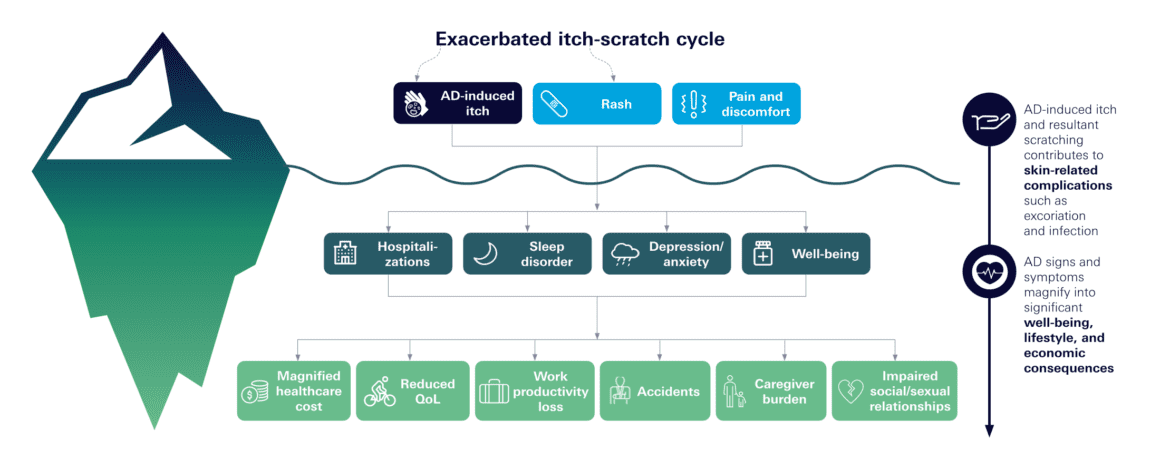At the AbbVie Symposium as part of the SGDV Congress 2024, Prof. Dr. Curdin Conrad (CHUV Lausanne) and Prof. Dr. Kilian Eyerich (University of Freiburg, Germany) discussed the concept of “Happy Patient, Happy Doctor?”, among other things. The focus was on atopic dermatitis (AD) and psoriasis (PsO), two chronic inflammatory skin diseases that are both physically and psychologically stressful [1, 2].
The “Happy Patient, Happy Doctor?” concept raises the question of whether the goal of happy patients can really be achieved and what the most important aspects to consider are in order to achieve it. During the discussion, the experts evaluated how best to assess patient stress and what needs to be considered when choosing a treatment method.

How can the stress of AD sufferers be meaningfully recorded?
Discussion Prof. Eyerich and Prof. Conrad:
The well-being of patients must be considered more comprehensively. In the case of AD, in addition to skin symptoms, this includes itching, insomnia and stigmatization – all of which have an enormous impact on the lives and satisfaction of those affected [3]. The classic image here is the “tip of the iceberg”: often only the skin symptoms are seen, while many other burdens lie hidden underneath (Fig. 1). The concept of the “happy patient” should therefore consider more than just EASI* scores. According to the HOME* initiative, there are different domains such as “clinical signs of disease”, “patient-reported symptoms”, “long-term disease control” and “quality of life” to assess the AD disease burden [4].

Fig. 1: AD can affect many aspects of patients’ lives, but not all effects are visible [3, 5-7]. QoL = quality of life.
What different scores are covered in the individual areas of the HOME initiative?
Discussion Prof. Eyerich and Prof. Conrad:
Classic scores such as the EASI measure the visible clinical signs of disease such as redness or skin thickness [4]. For the symptoms reported by patients, the HOME initiative recommends either the POEM* or Itch NRS* [4]. The Itch NRS is very helpful because it is quick and easy to use. For example, you can ask those affected: “How intense has your itching been in the last 24 hours on a scale of 0 to 10?” This is easy to understand and gives a clear picture. When it comes to quality of life, things get more complicated. The DLQI* is often used to measure the quality of life of those affected [4]. However, it also has weaknesses, especially for older patients or those who are socially isolated, and the score is often not used outside of large centers. Despite these limitations, the DLQI enables long-term comparisons of quality of life over many years. Finally, there is long-term disease monitoring, for which tools such as RECAP* and ADCT* are available, but which are rarely used regularly in practice [4].
Finally, what criteria indicate that the therapy goal has been achieved?
Discussion Prof. Eyerich and Prof. Conrad:
There are various approaches here, such as minimal disease activity (MDA) or treat-to-target (T2T ) [8, 9]. MDA considers both the objective severity of the disease and the subjective well-being of the patient. In this approach, patients are evaluated after three months for a short-term goal and after six months for a long-term goal [9]. This makes it possible to assess whether the therapy is successful or whether adjustments are necessary. The MDA approach in a disease such as AD makes sense, as most patients do not achieve complete remission. Nevertheless, it is a complex concept that needs to be continuously developed and re-evaluated. This also raises the question: what happens if the MDA goal is not achieved?
Why do several areas need to be improved to reduce the burden of AD for patients?
Discussion Prof. Eyerich and Prof. Conrad:
Studies show that the reduction of itching plays an important role in improving the quality of life of AD sufferers [10]. Even if skin symptoms are largely under control (EASI 90-100), patients’ quality of life may be impaired if itching persists (WP-NRS 2-10) [10]. Therefore, both skin symptoms and itching should be assessed regularly. Data show that an EASI 90 and WP-NRS 0/1 can be significantly improved and maintained over 140 weeks with upadacitinib (RINVOQ®) compared to placebo [11]. With JAKi, however, the risk-benefit profile must always be considered. A recent analysis over a treatment period of up to 5 years confirms the favorable benefit-risk profile of upadacitinib in the treatment of AD and showed no new safety risks [12]. It is important to monitor the risks and keep patients well informed. The decision to use JAKi should always be based on hard facts such as clinical factors, age and comorbidities.
What else needs to be considered when choosing AD therapy besides the points mentioned?
Discussion Prof. Eyerich and Prof. Conrad:
AD is a very heterogeneous disease and a personalized therapeutic approach makes sense here. While a standard approach is often sufficient for PsO, the fact that different molecular signaling pathways play a role in AD must be taken into account. The variety of cytokines involved – such as interleukin (IL)-4, IL-13, IL-31, TSLP, IFNγ and IL-22 – makes treatment more complicated [13]. While biologics bind to single cytokines or receptors and thus almost completely inhibit this target over a prolonged period of time, JAK signaling is downstream of multiple cytokines and efficacy can be observed at doses that partially and reversibly modulate multiple signaling pathways [14, 15]. Network meta-analyses show that all novel drugs provide comparable results in terms of improvement of skin symptoms and itching, at least in the short term [16]. The question therefore remains: Which therapy is best for which patient?
There has been steady progress in the treatment of PsO. Why is early intervention important in PsO?
Discussion Prof. Eyerich and Prof. Conrad:
IL-23 inhibitor data show that early intervention is crucial: improvement in skin symptoms is significantly better if treatment is started within the first two years of disease onset [17]. Other data on IL-17 inhibitors also show differences between patients with a disease duration of <1, 1-5 oder>5 years, with those with longer disease duration before treatment showing a greater likelihood of relapse. This underlines the potential importance of early intervention [18].
What are the other advantages of early treatment?
Discussion Prof. Eyerich and Prof. Conrad:
In addition to improving skin symptoms, early treatment could also reduce the risk of comorbidities such as cardiovascular disease and psoriatic arthritis [19, 20]. Modern treatments such as IL-17 and IL-23 inhibitors offer a better long-term risk-benefit profile for the treatment of moderate to severe psoriasis [21]. However, the key question remains: Which patients should be started early? Is it cost-effective to do this for everyone? The specialists treating patients are careful to do what is best for them without being overly burdened by the economic aspects.
Conclusion
The discussion made it clear that the treatment of AD and PsO continues to present complex challenges and that the subjective well-being of patients should be taken into account when planning and assessing therapy. While AD requires thinking beyond objective scores and greater consideration of quality of life and itchiness, early intervention in PsO is key to enable complete remission and prevention of comorbidities.
* Abbreviations: ADCT = Atopic Dermatitis Control Test; DLQI = Dermatology Life Quality Index; EASI = Eczema Area and Severity Index; HOME = Harmonizing Outcome Measures for Eczema; Itch NRS = Itch Numerical Rating Scale; POEM = Patient Oriented Eczema Measure; RECAP =Recap of Atopic Eczema.
Brief technical information RINVOQ® and SKYRIZI®
This article was produced with the financial support of AbbVie AG, Alte Steinhauserstrasse 14, 6330 Cham.
CH-ABBV-240123 01/2025
This article has been released in German.
Literature
1 Weidinger, S., et al, Atopic dermatitis. Nat Rev Dis Primers, 2018. 4(1): p. 1.
2 Griffiths, C.E.M., et al, Psoriasis. Lancet, 2021. 397(10281): p. 1301-1315.
3 Drucker, A.M., et al, The Burden of Atopic Dermatitis: Summary of a Report for the National Eczema Association. J Invest Dermatol, 2017. 137(1): p. 26-30.
4. Harmonizing Outcome Measures for Eczema (HOME). Home page. http://www.homeforeczema.org/ [Last accessed September 2024]. .
5 Simpson, E.L., et al, Patient burden of moderate to severe atopic dermatitis (AD): Insights from a phase 2b clinical trial of dupilumab in adults. J Am Acad Dermatol, 2016. 74(3): p. 491-8.
6 Whiteley, J., et al, The burden of atopic dermatitis in US adults: results from the 2013 National Health and Wellness Survey. Curr Med Res Opin, 2016. 32(10): p. 1645-1651.
7 Silverberg, J.I., Associations between atopic dermatitis and other disorders. F1000Res, 2018. 7: p. 303.
8 De Bruin-Weller, M., et al, Treat-to-Target in Atopic Dermatitis: An International Consensus on a Set of Core Decision Points for Systemic Therapies. Acta Derm Venereol, 2021. 101(2): p. adv00402.
9 Silverberg, J.I., et al, Combining treat-to-target principles and shared decision-making: International expert consensus-based recommendations with a novel concept for minimal disease activity criteria in atopic dermatitis. J Eur Acad Dermatol Venereol, 2024.
10 Reich, K., et al, Higher levels of response on clinical atopic dermatitis severity measures are associated with meaningful improvements in patient-reported symptom and quality of life measures: Integrated analysis of three upadacitinib phase 3 trials. J Eur Acad Dermatol Venereol, 2023.
11. Silverberg JI, et al. Efficacy and Safety of Upadacitinib Through 140 Weeks in Adolescents and Adults with Moderate-to-Severe Atopic Dermatitis: Phase 3 Randomized Clinical Trial Results. Oral presentation, presented at the European Academy of Dermatology and Venereology (EADV). October 2023. abstract 4392.
12 Bunick C, et al, Long-term 5-year safety of upadacitinib in atopic dermatitis: an integrated analysis including over 7000 patient-years of exposure, Revolutionizing Atopic Dermatitis (RAD), Virtual, 10 December 2023.
13 Guttman-Yassky, E., et al, The role of Janus kinase signaling in the pathology of atopic dermatitis. J Allergy Clin Immunol, 2023. 152(6): p. 1394-1404.
14 Clark, J.D., M.E. Flanagan, and J.B. Telliez, Discovery and development of Janus kinase (JAK) inhibitors for inflammatory diseases. J Med Chem, 2014. 57(12): p. 5023-38.
15 Virtanen, A.T., J. Raivola, and O. Silvennoinen, Selective JAKinibs: Prospects in Inflammatory and Autoimmune Diseases. BioDrugs, 2019. 33(1): p. 15-32.
16 Silverberg, J.I., et al, Comparative Efficacy of Targeted Systemic Therapies for Moderate to Severe Atopic Dermatitis without Topical Corticosteroids: Systematic Review and Network Meta-analysis. Dermatol Ther (Heidelberg), 2022. 12(5): p. 1181-1196.
17 Schakel, K., et al, Early disease intervention with guselkumab in psoriasis leads to a higher rate of stable complete skin clearance (‘clinical super response’): Week 28 results from the ongoing phase IIIb randomized, double-blind, parallel-group, GUIDE study. J Eur Acad Dermatol Venereol, 2023. 37(10): p. 2016-2027.
18 Lebwohl, M., et al, Investigation of plaque psoriasis relapse after secukinumab withdrawal in patients from two phase III studies. Clin Exp Dermatol, 2024. 49(8): p. 793-800.
19 Choi, H., et al, Treatment of Psoriasis With Biologic Therapy Is Associated With Improvement of Coronary Artery Plaque Lipid-Rich Necrotic Core: Results From a Prospective, Observational Study. Circ Cardiovasc Imaging, 2020. 13(9): p. e011199.
20 Singla, S., et al, Association between biological immunotherapy for psoriasis and time to incident inflammatory arthritis: a retrospective cohort study. Lancet Rheumatol, 2023. 5(4): p. e200-e207.
21 Armstrong, A.W., et al, Long-Term Benefit-Risk Profiles of Treatments for Moderate-to-Severe Plaque Psoriasis: A Network Meta-Analysis. Dermatol Ther (Heidelberg), 2022. 12(1): p. 167-184.
The references can be requested by specialists at medinfo.ch@abbvie.com.












